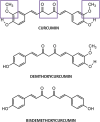Efficacy of curcumin for age-associated cognitive decline: a narrative review of preclinical and clinical studies
- PMID: 29679204
- PMCID: PMC5964053
- DOI: 10.1007/s11357-018-0017-z
Efficacy of curcumin for age-associated cognitive decline: a narrative review of preclinical and clinical studies
Abstract
Processes such as aberrant redox signaling and chronic low-grade systemic inflammation have been reported to modulate age-associated pathologies such as cognitive impairment. Curcumin, the primary therapeutic component of the Indian spice, Turmeric (Curcuma longa), has long been known for its strong anti-inflammatory and antioxidant activity attributable to its unique molecular structure. Recently, an interest in this polyphenol as a cognitive therapeutic for the elderly has emerged. The purpose of this paper is to critically review preclinical and clinical studies that have evaluated the efficacy of curcumin in ameliorating and preventing age-associated cognitive decline and address the translational progress of preclinical to clinical efficacy. PubMed, semantic scholar, and Google scholar searches were used for preclinical studies; and clinicaltrials.gov , the Australian and New Zealand clinical trials registry, and PubMed search were used to select relevant completed clinical studies. Results from preclinical studies consistently demonstrate curcumin and its analogues to be efficacious for various aspects of cognitive impairment and processes that contribute to age-associated cognitive impairment. Results of published clinical studies, while mixed, continue to show promise for curcumin's use as a therapeutic for cognitive decline but overall remain inconclusive at this time. Both in vitro and in vivo studies have found that curcumin can significantly decrease oxidative stress, systemic inflammation, and obstruct pathways that activate transcription factors that augment these processes. Future clinical studies would benefit from including evaluation of peripheral and cerebrospinal fluid biomarkers of dementia and behavioral markers of cognitive decline, as well as targeting the appropriate population.
Keywords: Aging; Cognition; Curcumin.
Figures
Similar articles
-
The effect of curcumin on cognition in Alzheimer's disease and healthy aging: A systematic review of pre-clinical and clinical studies.Brain Res. 2019 Dec 15;1725:146476. doi: 10.1016/j.brainres.2019.146476. Epub 2019 Sep 24. Brain Res. 2019. PMID: 31560864
-
Curcuma Longa, the "Golden Spice" to Counteract Neuroinflammaging and Cognitive Decline-What Have We Learned and What Needs to Be Done.Nutrients. 2021 Apr 30;13(5):1519. doi: 10.3390/nu13051519. Nutrients. 2021. PMID: 33946356 Free PMC article. Review.
-
Can Curcumin Counteract Cognitive Decline? Clinical Trial Evidence and Rationale for Combining ω-3 Fatty Acids with Curcumin.Adv Nutr. 2018 Mar 1;9(2):105-113. doi: 10.1093/advances/nmx013. Adv Nutr. 2018. PMID: 29659685 Free PMC article. Review.
-
Curcumin: A Golden Approach to Healthy Aging: A Systematic Review of the Evidence.Nutrients. 2024 Aug 15;16(16):2721. doi: 10.3390/nu16162721. Nutrients. 2024. PMID: 39203857 Free PMC article.
-
Curcumin and its Potential for Systemic Targeting of Inflamm-Aging and Metabolic Reprogramming in Cancer.Int J Mol Sci. 2019 Mar 8;20(5):1180. doi: 10.3390/ijms20051180. Int J Mol Sci. 2019. PMID: 30857125 Free PMC article. Review.
Cited by
-
Fusogenic liposomes effectively deliver resveratrol to the cerebral microcirculation and improve endothelium-dependent neurovascular coupling responses in aged mice.Geroscience. 2019 Dec;41(6):711-725. doi: 10.1007/s11357-019-00102-1. Epub 2019 Oct 25. Geroscience. 2019. PMID: 31654270 Free PMC article.
-
The effects of twenty-one nutrients and phytonutrients on cognitive function: A narrative review.J Clin Transl Res. 2021 Aug 4;7(4):575-620. eCollection 2021 Aug 26. J Clin Transl Res. 2021. PMID: 34541370 Free PMC article. Review.
-
Rheostatic Balance of Circadian Rhythm and Autophagy in Metabolism and Disease.Front Cell Dev Biol. 2020 Nov 24;8:616434. doi: 10.3389/fcell.2020.616434. eCollection 2020. Front Cell Dev Biol. 2020. PMID: 33330516 Free PMC article. Review.
-
Caveolin-1 promotes radioresistance via IRGM-regulated autophagy in lung cancer.Ann Transl Med. 2021 Jan;9(1):47. doi: 10.21037/atm-20-3293. Ann Transl Med. 2021. PMID: 33553340 Free PMC article.
-
Curcumin and Quercetin-Loaded Nanoemulsions: Physicochemical Compatibility Study and Validation of a Simultaneous Quantification Method.Nanomaterials (Basel). 2020 Aug 22;10(9):1650. doi: 10.3390/nano10091650. Nanomaterials (Basel). 2020. PMID: 32842590 Free PMC article.
References
-
- Anand P, Sung B, Kunnumakkara AB, Rajasekharan KN, Aggarwal BB. Suppression of pro-inflammatory and proliferative pathways by diferuloylmethane (curcumin) and its analogues dibenzoylmethane, dibenzoylpropane, and dibenzylideneacetone: role of Michael acceptors and Michael donors. Biochem Pharmacol. 2011;82(12):1901–1909. doi: 10.1016/j.bcp.2011.09.001. - DOI - PMC - PubMed
-
- Ataie A, Sabetkasaei M, Haghparast A, Moghaddam AH, Kazeminejad B. Neuroprotective effects of the polyphenolic antioxidant agent, curcumin, against homocysteine-induced cognitive impairment and oxidative stress in the rat. Pharmacol Biochem Behav. 2010;96(4):378–385. doi: 10.1016/j.pbb.2010.06.009. - DOI - PubMed
Publication types
MeSH terms
Substances
LinkOut - more resources
Full Text Sources
Other Literature Sources
Medical
Molecular Biology Databases



